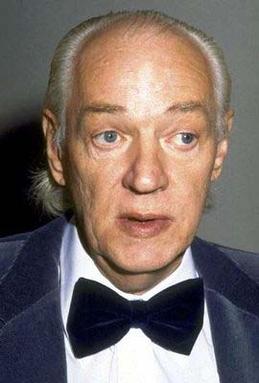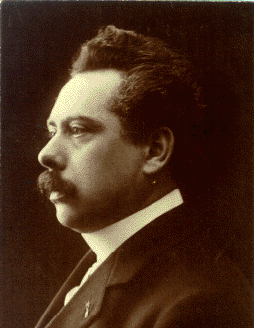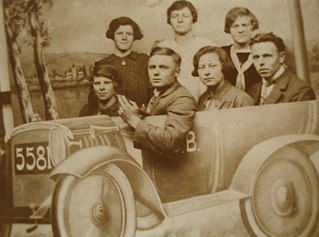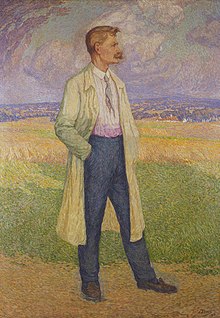
"Wilhelmus van Nassouwe", usually known just as "Wilhelmus", is the national anthem of both the Netherlands and the Kingdom of the Netherlands. It dates back to at least 1572, making it the oldest national anthem in use today, provided that the latter is defined as consisting of both a melody and lyrics. Although "Wilhelmus" was not recognized as the official national anthem until 1932, it has always been popular with parts of the Dutch population and resurfaced on several occasions in the course of Dutch history before gaining its present status. It was also the anthem of the Netherlands Antilles from 1954 to 1964.

Lambertus Jacobus Johannes "Bertus" Aafjes was a Dutch poet noteworthy for his poems about resistance to German occupation during World War II.

Leopold Maximiliaan Felix Timmermans is a much translated author from Flanders. He was nominated for the Nobel Prize in Literature three times.

Cyrillus Gustave Emile "Cyriel" Buysse was a Flemish naturalist author and playwright. He also wrote under the following pseudonyms: Louis Bonheyden, Prosper Van Hove and Robert Palmer.

Andreas Ernestus Josephus Claes was a Belgian author. He is best known for his regional novels, including De Witte ("Whitey"), which was the source material for the first Flemish movie: De Witte (1920). In 1980 it was remade as De Witte van Sichem by Robbe De Hert.

Gorki was a Belgian rock group, in its most recent line-up consisting of Luc De Vos, Luc Heyvaerts, Erik Van Biesen, Thomas Vanelslander (guitarist) and Bert Huysentruyt (drums). Three songs by Gorki were number one hits in the Studio Brussel alternative hitlist De Afrekening in Belgium: 'Lieve kleine piranha', 'Schaduw in de schemering and 'Joerie' in 2006. Luc De Vos died on 29 November 2014.
Isidoor Teirlinck was a Belgian writer. He is best known for his work on folklore.

Jacob Lodewijk Gerard, Baron Walschap, was a Belgian writer.

Maurits Sabbe, born Maurice Charles Marie Guillaume Sabbe, was a Flemish man of letters and educator who became curator of the Plantin-Moretus Museum in Antwerp.

Filip De Pillecyn was a Belgian writer, and a member of the Flemish movement. He was born at Hamme, and died in Ghent.
Paul Kenis was a Flemish writer.

Wilhelmina Drucker was a Dutch politician and writer. One of the first Dutch feminists, she was also known under her pseudonyms Gipsy, Gitano, and E. Prezcier.

Ernest Van der Hallen was a Flemish writer and Catholic youth leader during the Interbellum. Van der Hallen was an inspirational figure for the Flemish nationalist youth movement.

Klaziena (Ina) Boudier-Bakker was a Dutch writer of novels. Her most famous work is De klop op de deur, written in 1930.

Marie "Rie" Cramer was a Dutch writer and prolific illustrator of children's literature whose style is considered iconic for the interwar period. For many years, she was one of the two main illustrators for a leading Dutch youth magazine, Zonneschijn (Sunshine). She also wrote plays under the pseudonym Marc Holman. Some of her work was banned during World War II because it attacked National Socialism, and she wrote for a leading underground newspaper during the war.

André Demedts was a Belgian Flemish writer and teacher. He has published works in many genres, all in Dutch. In 1962 he received the Prijs voor Letterkunde van de Vlaamse Provincies for his work De levenden en de doden. In 1976 he received the award in honour of his life-time career. In 1990 he has received the Award "Driejaarlijkse Staatsprijs voor literatuur" to honour his career as a writer. In 1970 the award André Demedtsprijs was established to reward persons engaged in the cause of the large Dutch/Flemish cultural development with a main purpose to integrate and entangle cultural activities in the Netherlands, Flanders and South Africa.
The Toneelschrijfprijs is an annual literary award awarded to the playwrights of a Dutch-language play that debuted in the preceding season. The award ceremony is held in either Flanders or the Netherlands. The winner of the prize receives €10,000. The prize was first awarded in 1988 as the Nederlands-Vlaamse Toneelschrijfprijs.
In the Netherlands, the Vlag en Wimpel award is an honourable mention awarded by either the jury of the Gouden Griffel and Zilveren Griffel awards or the jury of the Gouden Penseel and Zilveren Penseel awards. The award is organised by the Collectieve Propaganda van het Nederlandse Boek. Starting in 2022, instead of Flags and Pennants, Bronze Griffels and Bronze Brushes will be awarded. The name change is intended to underscore the purpose of these awards: to highlight the best children's books.

Jozef Maria August Antoon (Jef) Van den Eynde was a prominent figure from Leuven's student life, an activist and member of the Council of Flanders during the First World War.

















